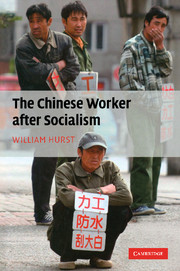Book contents
- Frontmatter
- Contents
- List of illustrations
- Preface
- Introduction
- 1 Regional political economy and labor reform
- 2 The roots of unemployment and the political economy of lay-offs
- 3 Remaking China's urban welfare and labor market policies
- 4 Pathways to re-employment
- 5 Contention, protest, and social order
- Conclusion
- Appendix: List of interviewees
- Bibliography
- Index
Conclusion
Published online by Cambridge University Press: 02 July 2009
- Frontmatter
- Contents
- List of illustrations
- Preface
- Introduction
- 1 Regional political economy and labor reform
- 2 The roots of unemployment and the political economy of lay-offs
- 3 Remaking China's urban welfare and labor market policies
- 4 Pathways to re-employment
- 5 Contention, protest, and social order
- Conclusion
- Appendix: List of interviewees
- Bibliography
- Index
Summary
Introduction
The preceding chapters have examined the causes of lay-offs, state responses, workers' coping strategies, and patterns of contention. The basis for all of this has been a subnational comparative analysis of Chinese regions. This has enabled more nuanced explanations and the formulation of a number of hypotheses, to explain not just the outcomes of interest but also the antecedent conditions required for these explanations to operate.
Specifically, though business environments and central–local relations produced lay-offs across all four regions, the timing and the manner of change were different. Northeastern SOEs found themselves structurally disadvantaged in the market and virtually abandoned by the central state, and laid off large numbers of workers beginning in the 1980s. Central Coast firms dealt with voluntary departures of workers entering the non-state sector and also with higher-level directives to lead the way along the national path toward capitalist reform and development. This meant sharp declines pre-1997 that had more to do with the pull of market opportunity than anything else, followed by later decreases in Central Coast workforces driven by a desire to become market leaders. Sector-specific pressures produced lay-offs in North-Central and Upper Changjiang firms before 1997, followed by sharper cuts, in the immediate aftermath of the fifteenth Party Congress, that continued in the Upper Changjiang but largely tailed off in the resource-extractive firms of the North-Central region.
Also, though the central state undertook several overarching initiatives under the re-employment project, regional variation in implementation and policy innovation was often more important.
- Type
- Chapter
- Information
- The Chinese Worker after Socialism , pp. 133 - 144Publisher: Cambridge University PressPrint publication year: 2009

